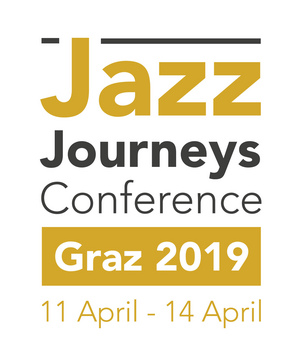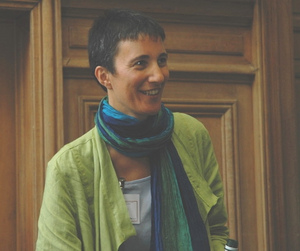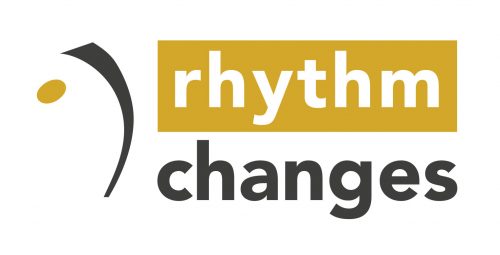Rhythm Changes Conference 2019 Graz
 The Sixth Rhythm Changes Conference: Jazz Journeys will take place at the University of Music and Performing Arts Graz in Austria from 11 to 14 April 2019.
The Sixth Rhythm Changes Conference: Jazz Journeys will take place at the University of Music and Performing Arts Graz in Austria from 11 to 14 April 2019.
Keynote Speakers
Prof. Jason Stanyek (University of Oxford)
Prof. Marie Buscatto (University of Paris 1 Panthéon Sorbonne)
Closing Address
Prof. Alan Stanbridge (University of Toronto)
 Jason Stanyek teaches at the University of Oxford where he is Associate Professor of Ethnomusicology and Tutorial Fellow at St. John’s College. Previously, he was Assistant Professor at New York University, Visiting Associate Professor at Harvard, and External Faculty Fellow at Stanford. His research on Pan African jazz, mobile music, improvisation, music technology, and Brazilian music and dance has appeared in a range of publications. His 2010 article (co-authored with Benjamin Piekut) “Deadness: Technologies of the Intermundane” was selected by MIT Press as one of the 50 most influential articles published over the past 50 years in all of their journals across all disciplines. Currently, he serves as editor of 33 1/3 Brazil, an offshoot of Bloomsbury’s long-running 33 1/3 series, and as co-editor (with Pauline Fairclough) of the Cambridge UP journal Twentieth-Century Music. He is a founding editorial board member of the journal Sound Studies.
Jason Stanyek teaches at the University of Oxford where he is Associate Professor of Ethnomusicology and Tutorial Fellow at St. John’s College. Previously, he was Assistant Professor at New York University, Visiting Associate Professor at Harvard, and External Faculty Fellow at Stanford. His research on Pan African jazz, mobile music, improvisation, music technology, and Brazilian music and dance has appeared in a range of publications. His 2010 article (co-authored with Benjamin Piekut) “Deadness: Technologies of the Intermundane” was selected by MIT Press as one of the 50 most influential articles published over the past 50 years in all of their journals across all disciplines. Currently, he serves as editor of 33 1/3 Brazil, an offshoot of Bloomsbury’s long-running 33 1/3 series, and as co-editor (with Pauline Fairclough) of the Cambridge UP journal Twentieth-Century Music. He is a founding editorial board member of the journal Sound Studies.
 Marie Buscatto is Professor of Sociology at the University of Paris 1 Panthéon Sorbonne (France). Based on her initial research on the processes limiting women’s access to the world of jazz, her current work focuses on social inequalities affecting artists and qualified workers’ trajectories in western countries. She also studies subjective and objective ambivalencies affecting artistic practices, careers and professions in Europe, in the US and in Japan. Finally, she reflects on the epistemological status of qualitative methods.
Marie Buscatto is Professor of Sociology at the University of Paris 1 Panthéon Sorbonne (France). Based on her initial research on the processes limiting women’s access to the world of jazz, her current work focuses on social inequalities affecting artists and qualified workers’ trajectories in western countries. She also studies subjective and objective ambivalencies affecting artistic practices, careers and professions in Europe, in the US and in Japan. Finally, she reflects on the epistemological status of qualitative methods.
 Alan Stanbridge is an Associate Professor at the University of Toronto, teaching in Music & Culture and Media Studies in the Department of Arts, Culture and Media, and in the Master of Museum Studies Program. He offers courses in music and society, jazz history, film music, cultural theory, and cultural policy. Stanbridge has published numerous articles and book chapters on popular music, jazz history, and cultural policy, and he is currently working on a book entitled Rhythm Changes: Jazz, Culture, Discourse, to be published by Routledge. In a previous life, Stanbridge pursued a 15-year career in professional arts management and music promotion in the UK, during which time he held the post of Director of the Glasgow International Jazz Festival.
Alan Stanbridge is an Associate Professor at the University of Toronto, teaching in Music & Culture and Media Studies in the Department of Arts, Culture and Media, and in the Master of Museum Studies Program. He offers courses in music and society, jazz history, film music, cultural theory, and cultural policy. Stanbridge has published numerous articles and book chapters on popular music, jazz history, and cultural policy, and he is currently working on a book entitled Rhythm Changes: Jazz, Culture, Discourse, to be published by Routledge. In a previous life, Stanbridge pursued a 15-year career in professional arts management and music promotion in the UK, during which time he held the post of Director of the Glasgow International Jazz Festival.
Jazz has typically been the music of journeys and mobility. Its history is inseparable from global patterns of migration and changing demographics, as well as new forms of media communication and cultural production. The music speaks as much to dreams of escape as it does to the desire to put down roots; it continually seeks new pathways to meaning, even as it reinforces old boundaries. Jazz Journeys seeks to critically explore how ideas of mobility, movement, travel, exchange, voyaging, border-crossing and odyssey have shaped – and continue to shape – debates about the music’s past and future.
Journeys — Mobility and Travels
This theme addresses hemispheric or global cultural movements in jazz, from the legacies of transatlantic slavery to the emergence of jazz communities throughout the world. We invite papers that engage with the different kinds of journeys that musicians undertake, from stylistic development to their involvement in the processes of migration and mobility, cross-cultural exchange, colonialism, and empire(s).
Journeys — Journées
This theme explores jazz as a companion to everyday life in private and public spaces, in the light of changing modes of interaction with the music. Are new technologies and platforms such as Spotify and Facebook changing the way we deal with jazz? How does jazz feature as a soundtrack to our ordinary existence? How do such regular interactions (or the avoidance of such interactions) reveal ideas about the meaning and value of jazz?
Journeys — Journal — Diary: History, Narrative, (Auto)biography
This theme explores the ways in which the experience of music is captured and the story of jazz told, from dominant narratives to (auto)biographies, popular tales to hidden histories. We welcome papers that interrogate dominant forms of causal and linear narration and engage with the ways in which the stories of jazz are written, adapted and changed through time. The theme seeks to engage with the underlying values that shape understandings of jazz and influenced what is celebrated and what ignored.
Journeys — Journals — Research
Fifty years ago, the founding of Jazzforschung / Jazz Research and Beiträge zur Jazzforschung / Studies in Jazz Research in Graz positioned jazz studies as an important area of musicology and related disciplines. We invite papers that explore the gaps, limitations and tensions in our understanding of jazz research, as well as new directions in the field.
Journeys — Journalism, Media and Technologies
This theme investigates the role of writing, mediatisation and technological change in the production, dissemination, and experience of jazz. We invite papers focusing on the ways in which ideas, sounds and images about the music circulate globally between artists, critics, audiences, and producers.
Journeys — Time(s) and Temporalities
This theme explores concepts of time and temporality in jazz, from the uses of multiple tempos and time signatures to theories and practices of repetition and revision. We invite papers that respond to the different times, temporalities, tempos, moments, instances, junctures, speeds, passages, and movements in and out of time that characterise jazz history and its practices.
Journeys — The Seductions of Alliteration
This theme addresses the many journeys in language, sound, gesture, and image that shape our understanding of jazz, including spontaneous writing, creative writing from the Harlem Renaissance, and Beat literature. We welcome papers that experiment with how to get from A to B, that sound out new ways of speaking of and thinking about jazz, and envision new practices and processes of writing about, and performing with, the music.
Jazz Journeys continues to build on the legacy of the research project Rhythm Changes: Jazz Cultures and European Identities (2010–2013), which was funded as part of the Humanities in the European Research Area (HERA) Joint Research Programme. In the spirit of Rhythm Changes, the project team continues to develop networking opportunities and champion collaborative research in transnational jazz studies.
Updates on the conference and information about travel and accommodation will be available at www.rhythmchanges.net and https://www.facebook.com/jazzresearch/.
Registration
Early Bird Registration for the Sixth Rhythm Changes Conference Jazz Journeys is now open!
Please klick here to register for the event.
TRAVEL INFORMATION: How to get to the University of Music and Performing Arts Graz (Kunstuniversität Graz)
By plane:
1. From Graz International Airport (Flughafen Graz) to Graz city center http://flughafen-graz.at/home.html
Bus connection: Buses No. 630 or 631 bring you conveniently from Graz Airport to “Jakominiplatz” (central point of transfer in the city center). The bus stop is right outside the passenger terminal, next to the arrival area. The price for a one-way trip is € 2,30 (1-hour ticket Graz); the duration is ca. 22 min.
Train connection: Train S5 goes to the “Graz Central Railway Station”. The railway station is a short walk (5 min.) from the passenger terminal at the airport. The price for a one-way trip is € 2,30 (1-hour ticket Graz); the duration is ca. 12 min.
Follow the link for bus and train connections as well as timetable information: http://www.flughafen-graz.at/en/terminal/anreise-parken/bus-bahn.html (Schedule).
Taxi: You can also comfortably reach the Kunstuniversität Graz by taking a taxi (about € 25,00).
2. From Vienna International Airport (Flughafen Wien-Schwechat) to Graz city center https://www.viennaairport.com
Bus connection: This pdf-file provides general information as well as a timetable about the bus connections between Vienna airport and Graz; the duration is ca. 2,30 hrs. You can either get a ticket directly in the bus for € 22,00 (while stocks last) or you book your bus connection online following this link (tickets between € 17,50 and € 22,00): http://bit.ly/2p4aJ2o
Train connection: Follow this link for rail connections to Graz Hbf (= Graz Central Railway Station): https://www.viennaairport.com/en/passengers/arrival__parking/s-bahn__suburban_railway.
You can book your train ticket online via the ÖBB website for € 46,60, and if you book the ticket in advance, you can often get a better deal; the duration is ca. 3 hrs.: https://www.oebb.at/en/.
From Graz Central Railway Station (Hauptbahnhof Graz) or from Jakominiplatz to the University of Music and Performing Arts Graz (Leonhardstrasse 15, 8010 Graz):
Tram: Take tram No. 1 (direction “Mariatrost”) or No. 7 (direction “LKH Med Uni / Klinikum Nord”) Stop: “Lichtenfelsgasse / Kunstuniversität”
This pdf-file provides a map of Graz highlighting central points of transfer as well as the location of the Kunstuniversität Graz.
ACCOMODATION
For participants of the Sixth Rhythm Changes Conference Jazz Journeys, a number of rooms (including breakfast) are blocked at the following hotels from 11.04.–15.04.2019:
Hotel Gollner– http://www.hotelgollner.com/:
€ 103,00 per night (single room); rooms are blocked until 15.02.2019; Reference: “Jazz Journeys”
Schlögelgasse 14, 8010 Graz; Tel.: +43 316 822 521; E-mail: office(at)hotelgollner.com
Das Weitzer – https://www.hotelweitzer.com/:
€ 111,00 per night (single room), € 129,50 per night (double room); rooms are blocked until 14.02.2019; Reference: “Jazz Journeys”; please use this booking form!
Grieskai 12–14, 8020 Graz; Tel.: +43 316 703 400; E-mail: reservations(at)weitzer.com
Hotel Ibis – http://www.ibis.com/de/hotel-1917-ibis-graz/index.shtml:
€ 80,00 per night (single room), € 94,00 per night (double room); rooms are blocked until 28.02.2019; Reference: “Jazz Journeys”
Europaplatz 12, 8020 Graz; Tel.: +43 316 7780; E-mail: h1917-re(at)accor.com(Viktoria Schatzer or Andreas Dayé)
Hotel Ibis Budget– http://www.ibis.com/de/hotel-5107-ibis-budget-graz-city/index.shtml:
€ 52,00 per night (single room), € 66,00 (double room); rooms are blocked until 15.02.2019; Reference: “Jazz Journeys”
Neubaugasse 11, 8020 Graz; Tel.: +43 316 764 400; booking only via E-mail: h5107-fo1(at)accor.com (Martina Krall)
Feichtinger Hotel– http://www.hotel-feichtinger.at:
€ 74,70 per night (single room), € 109,00 (double room); rooms are blocked until 29.03.2019; Reference: “Jazz Journeys”
Lendplatz 1a, 8020 Graz; Tel.: +43 316 724 100; E-mail: office(at)hotel-feichtinger.at
Amedia, Best Western Plus– http://bit.ly/2BtiPqQ:
€ 75,00 per night (single room), € 99,00 (double room); rooms are blocked until 10.03.2019; Reference: “Jazz Journeys”
Conrad-von- Hötzendorfstr. 60, 8010 Graz; Tel.: +43 316 24 555 604; E-mail: reservierung(at)graz.plazahotels.de
Parkhotel Graz – https://www.parkhotel-graz.at:
€ 122,00 per night (single room); rooms are blocked until 21.03.2019; Reference: “Jazz Journeys”
Leonhardstraße 8, 8010 Graz; Tel.: +43 316 3630 26; E-mail: office(at)parkhotel-graz.at
List of further recommended hotels in Graz:
Lend Hotel, http://lendhotel.at
Roomz Graz, roomz-graz.hotel-rn.com
Hotel Daniel, https://hoteldaniel.com/de/graz/

